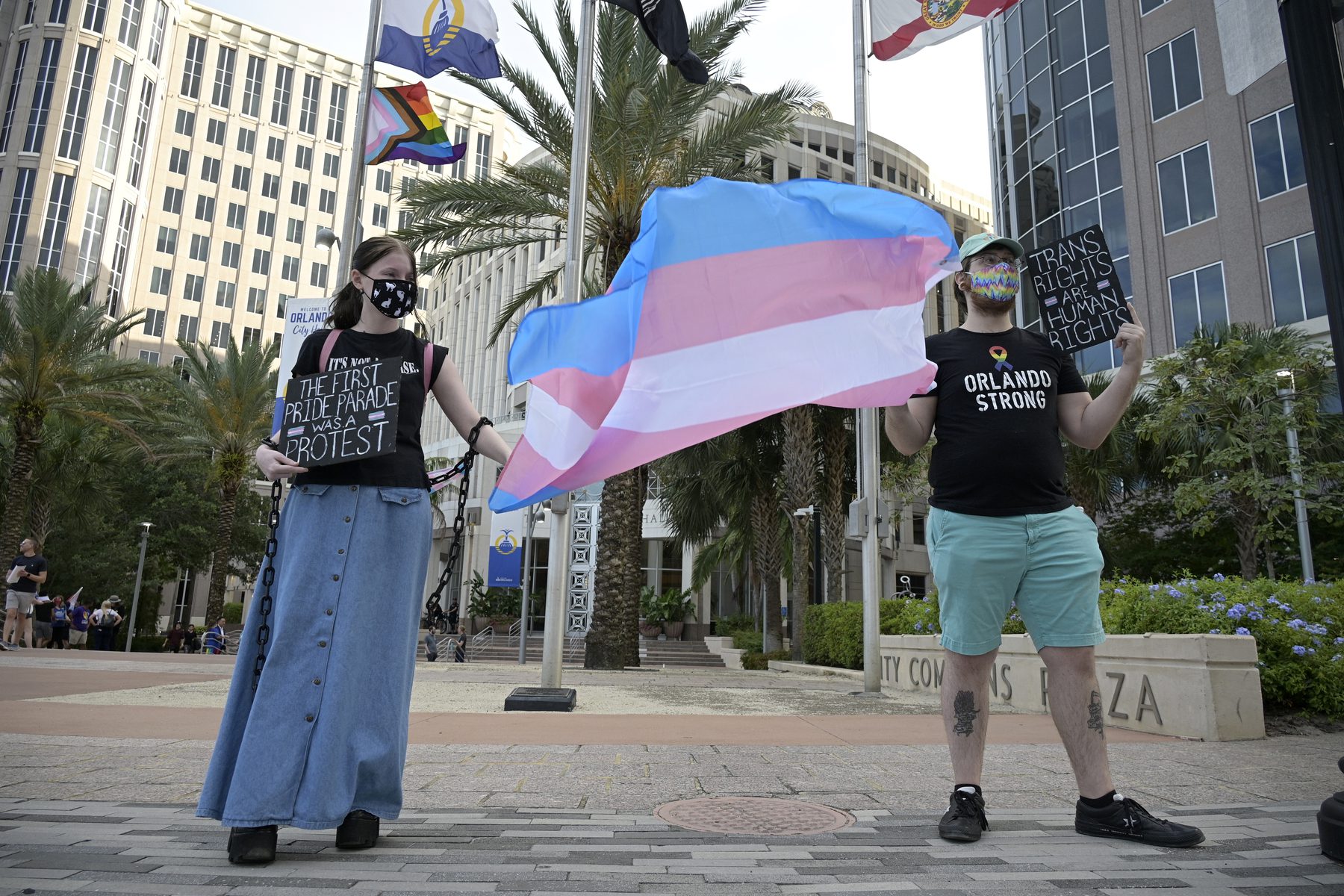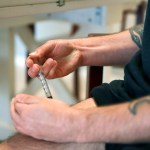We’re telling the untold stories of women, women of color and LGBTQ+ people. Subscribe to our daily newsletter.
The other shoe finally dropped for Caitlin and her 6-year-old daughter Thursday. If her daughter wants to start puberty-blocking medication as she gets older, she won’t be able to in their home state of Florida.
“Nobody wants their child to have to go through what our child is going through,” said Caitlin, who asked to use only her first name to protect her family.
A rule issued by Florida’s board of medicine banning gender-affirming care for transgender youth who have not yet begun treatment goes into effect today, March 16, according to the Southern Legal Counsel, which plans to sue the state over the ban alongside national advocacy groups. The exact age for treatment varies but should align with the onset of puberty, according to the World Professional Association for Transgender Health.
Doctors in Florida who prescribe puberty blockers or hormone treatment therapy to new patients — youth who have not yet begun such care — risk losing their licenses and being held liable by the state’s board of medicine. Trans youth who are already receiving gender-affirming care can continue treatment as before.
Details of how the rule will be enforced are unclear — including whether doctors can be penalized for prescribing hormone treatment to a trans minor who had already begun puberty-blocking medication. It’s also not clear how violations would come to the attention of the board, said Simone Chriss, attorney with the Southern Legal Counsel in Florida and director of the organization’s transgender rights initiative.
“This is very unusual, what the board of medicine has done,” Chriss said. “They don’t ban entire areas of practice, like all treatment for any particular diagnosis. So we’re going to have to see it play out in real time.” Nothing in the board of medicine’s rule penalizes or prohibits Florida parents from seeking gender-affirming care for their child or going out of state to find the care, Chriss said.
Brittany Bruggeman, a pediatric endocrinologist at the University of Florida’s youth gender program, said incoming new patients who have appointments for the next two months at the clinic have received letters to explain that doctors won’t be able to prescribe new medications until patients are at least 18. The program works with patients up to 22 years old.
“We are continuing to see our current patients as usual. We want to make that clear,” Bruggeman said.
Bruggeman, who sees about 15 to 20 patients a month through the youth gender clinic, said patients and families are worried about the rule taking effect. Patients are wondering whether they should move out of state and what to do if their child needs to start gender-affirming care now.
“We’ve been getting multiple messages and phone calls asking these questions that we’re not sure of the answers to,” she said. “These patients know that medical treatment is going to be their best option in the future, but they’re not going to have access to that care. There’s a lot of desperation from some patients.”
When those patients ask what they can do, Bruggeman doesn’t have answers — other than seeking treatment out of state.
As a parent, Caitlin knows that leaving Florida is a real possibility for her family as the state mounts legislative attacks on trans rights that go beyond the board of medicine’s rule. The move would be hard, but she is determined to prevent her daughter from feeling more pain than she already has.
Caitlin and her husband were in denial for a long time about their daughter’s identity. By age 4, their daughter was bringing it up every day, screaming and begging her parents to understand, throwing her “boy clothes” out of her room, and expressing suicidal feelings at the thought of being in a boy’s body. They sought therapists, doctors and experts.
It became clear that letting their daughter be herself was the best possible intervention, Caitlin said. She advises parents in similar situations to listen to their kid and not to push one way or the other, to seek books and outside resources, and to take a slow and thoughtful approach.
Caitlin, who lives on Florida’s east coast with her 6-year-old, her 3-year-old and her husband, feels paralyzed by the political environment in Florida and how it threatens her daughter’s future. A few months ago, she told her daughter that she can’t tell friends at school about being transgender — in order to protect her safety. The family is also planning to put their 6-year-old in private school next year, although her public school has been supportive.
“I’m worried about the fact that every day there’s a new bill that comes out and we don’t know how far they’re going to take this,” Caitlin said. She also lives in fear of neighbors learning about their child’s gender identity and what they might do.
Other, more expansive restrictions on gender-affirming care have been introduced in Florida’s statehouse. One bill currently advancing through the state Senate would make providing care to minors a third-degree felony and restrict adults’ insurance coverage for gender-affirming care. A separate bill would prevent trans adults from updating their birth certificates and require trans adults to sign informed consent paperwork created by the board of medicine — which last year advocated that adults undergo a 24-hour waiting period for care. That bill would also protect hospital employees from disciplinary action if they refuse gender-affirming care to trans adults on “clinical, moral, or religious grounds.”
Another proposed bill currently in committee would ban trans adults from using bathrooms or changing rooms that match their gender identity in schools, health care facilities and private businesses — with the potential to be charged with a misdemeanor for doing so.
Families of trans youth, as well as trans and nonbinary young adults in Florida, feel under siege by the current political environment in the state. Trans young adults, who are not affected by the board of medicine’s rule, are especially pained as they watch their state legislature take aim at their lives and their friends’ lives.
Star Williams, a 22-year-old nonbinary activist who lives in Tallahassee, testified in February at the Florida board of medicine’s last meeting for public comment on its gender-affirming care ban. They hoped the board members would glean a new perspective: What would they do if their own child was gender non-conforming, nonbinary or trans? What if they needed such care?
“We don’t think about these things until we’re in the shoes or until it actually appears in our lives,” Williams said.
In the face of the board of medicine’s rule on gender-affirming care, and as the state considers at least 10 anti-LGBTQ+ bills, Nathan Peters has found himself afraid to go to the doctor.
-
More Florida coverage
- A proposed six-week abortion ban in Florida could threaten access for the entire South
- More than half of queer Florida parents have considered fleeing the state in the wake of ‘Don’t Say Gay,’ study finds
- Canceled high school play raises concerns over ripple effects of Florida’s ‘Don’t Say Gay’ law
“I just don’t have the mental capacity right now to be dismissed for medical care,” he said. Peters, a 25-year-old queer trans man, struggled to find gender-affirming doctors after moving to Florida from Washington state. Now living in Orlando, he pays $85 a month for a three-month testosterone supply to be mailed to him from Folx Health, an LGBTQ+ telehealth provider.
“It would wreck me if I didn’t have my hormones. It wouldn’t affect me immediately, because changes take time, and some of these changes on testosterone are permanent, but some of them aren’t,” he said. Physically and emotionally, having to stop hormone treatment would put his body through dysphoric and volatile changes. He would consider taking up unsafe, black market testosterone if it were banned or restricted for adults by the state.
Like Williams, Peters testified at the last gathering for public comment on the board of medicine’s gender-affirming care ban, taking a bus from Orlando into Tallahassee to do so. Although the board’s ban on care won’t affect Peters, it was hard to not feel directly targeted by the decision-making progress on gender-affirming care playing out in front of him.
Caitlin doesn’t know what the future holds for her daughter — whether she’ll want to start puberty blockers or hormone treatment when she gets older, or what her daughter’s needs will be as she transitions. But she does know that protecting her daughter may require leaving the state that she and her husband grew up in.
Chriss said the discussion of whether to move, or to send kids to live with family in a different state, is happening among many families with trans kids in Florida — and among four families who have had direct conversations with her. Two of those families are considering moving because the new rule cuts off their children’s access to care; the other two won’t be affected by the rule, but expect the atmosphere in the state to get worse.
“I’ve never experienced this kind of complete devastation among the community that I serve,” Chriss said. “It’s simply so unsafe and dangerous here to exist as a trans kid and it’s obvious that these attacks are increasing in frequency and severity. I think a lot of people are just really, really afraid and disheartened.”
The Southern Legal Counsel, GLBTQ Legal Advocates & Defenders, the National Center for Lesbian Rights, and the Human Rights Campaign plan to file a lawsuit against the board of medicine rule in federal court, per a Thursday press release.
Caitlin, now considering a financially stressful move out of state, said that she went to every public meeting through the decision-making process for the board of medicine rule — and has gone to protests, written letters, lobbied for donations to advocacy groups, and educated friends and family about trans rights. And yet, she feels unable to help her daughter.
“I’m powerless to protect my child while still living in Florida. That’s how I feel right now.”







